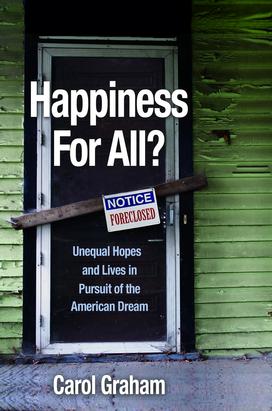Carol Graham ’84 Considers The American Dream and Inequality

The author: Carol Graham ’84 is a well-being researcher and the Leo Pasvolsky Senior Fellow at the Brookings Institution. She also works as a professor at the University of Maryland School of Public Policy. Graham’s prior works include, Happiness Around the World: The Paradox of Happy Peasants and Miserable Millionaires (Oxford University Press) and The Pursuit of Happiness: An Economy of Well-Being (Brookings Focus Books).
Opening lines: “The U.S. Pledge of Allegiance promises liberty and justice for all. The U.S. Declaration of Independence guarantees the rights to life, liberty, and the pursuit of happiness to all its citizens. These promises are not about guaranteed outcomes, but about opportunities to seek fulfilling lives. They have a long grounding in history and philosophy, beginning with Aristotle’s concept of happiness. This concept — eudemonia — is not about contentment, but about having sufficient means to be able to seek purpose and meaning in life. When Jefferson conceived of the pursuit of happiness, he was grounded in the works of Plato and Aristotle, as well as in the kind of liberalism articulated by John Stuart Mill, which combines notions of individual freedom and societal fairness. … These promises are the basis of the American Dream, with its strong focus on individual freedom, opportunity, and faith in future mobility.
”Yet there is increasing debate about — both academic and political — about the extent to which the American Dream — and the right to the pursuit of happiness — is equally available to all citizens today. U.S. trends in opportunity and in distributional outcomes are becoming more unequal by any number of measures. Is the ability to pursue happiness as unequally shared as income in the United States? While U.S. attitudes about inequality and opportunity have historically been exceptional, are they still? Do these attitudes, which are historically linked to happiness and optimism about the future, affect individual choices about investments in the future and therefore life chances and outcomes?”
Reviews: Princeton professor Angus Deaton, Nobel laureate in economics, writes, “Carol Graham uses well-being measures to bring new insights to the divisions that are threatening America. Far from dreaming of a better tomorrow, many Americans, especially white Americans, are deeply pessimistic about their future and the futures of their children. This book brings much to think and worry about.”












No responses yet